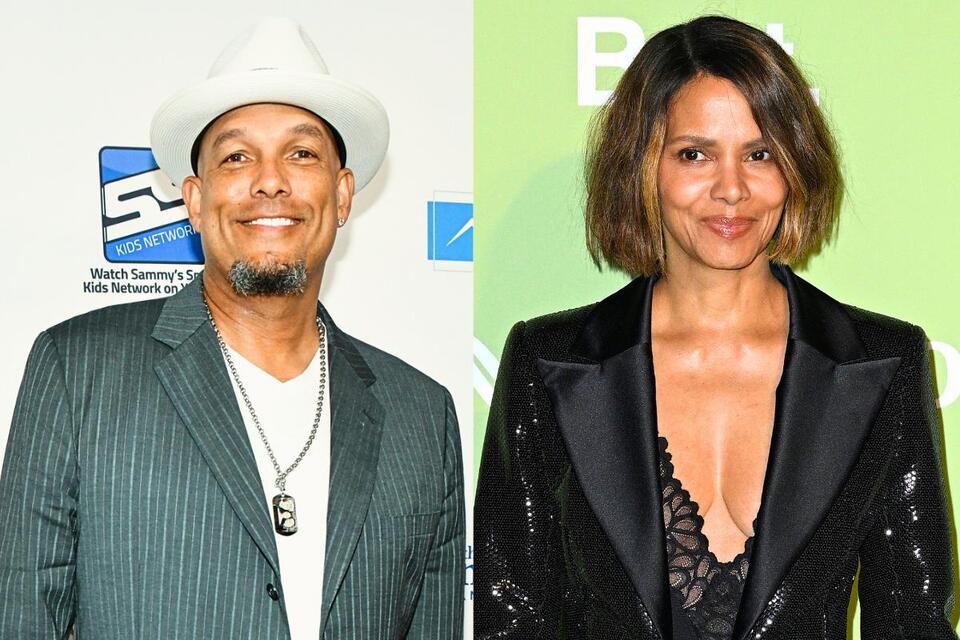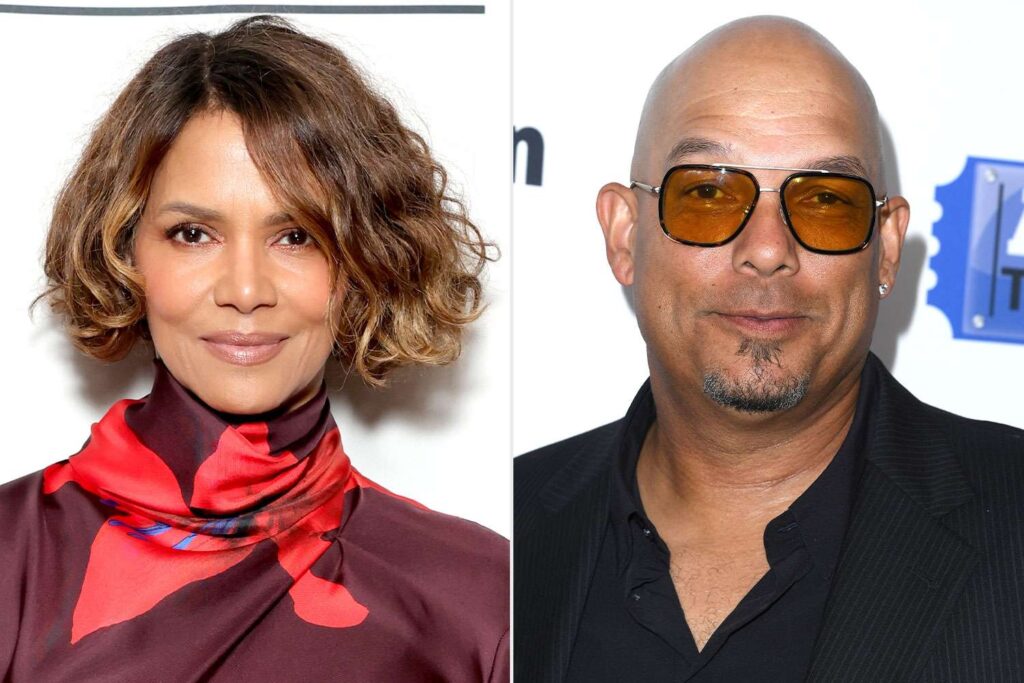David Justice has finally opened up about his short-lived but high-profile marriage to Halle Berry, and what he has to say is as revealing as it is reflective. After nearly three decades of silence on the topic, the former Atlanta Braves star sat down on the “All the Smoke” podcast with Matt Barnes and shared details about their relationship that were never public before. For years, the story of their marriage had mostly been shaped by the media, unconfirmed allegations, and the glamour that surrounded two young, successful stars tying the knot. But what Justice revealed paints a far more personal, imperfect, and human picture of two people who got swept up in something faster and heavier than they were prepared for.
He recalls how it all began — and how quickly it all moved. Berry proposed to him just five months into dating, a surprise that caught him completely off guard. He admits that he didn’t really know how to respond in that moment. Not because he wasn’t fond of her, but because he wasn’t sure if he was ready. Still, he said yes. He didn’t want to hurt her feelings or disrupt the flow of what felt like an exciting and passionate time in both their lives. At that stage, everything was moving fast, fueled by chemistry, early-stage romance, and maybe a touch of fantasy. “I don’t know if my heart was really into it,” he confessed, explaining that he was caught in the moment. They were vibing, things were good, and the gravity of the decision to marry hadn’t yet settled in.
But real life, as it tends to do, began to set in shortly after. Justice talks about how his upbringing in the Midwest shaped his expectations of what a traditional marriage might look like. In his mind, a wife was someone who would cook, clean, and carry certain domestic responsibilities — particularly if children were to be involved. These weren’t necessarily malicious expectations, just what he knew from the example of his own mother. When Berry didn’t meet those ideals, it caused him to question whether their relationship had long-term viability. She didn’t cook, didn’t clean, and didn’t seem motherly to him at that point in their lives. It wasn’t about control or resentment, he explains, but more of a misalignment in values and lifestyle — something that doesn’t always become clear until the honeymoon phase wears off.
Time apart didn’t help. Berry’s career was taking off, and she was often out of the country working on film sets. Meanwhile, Justice was still in the thick of his baseball career, rooted in a lifestyle that required stability and familiarity. The distance and the demands of their respective careers likely added strain to a marriage that was already fragile. He said things didn’t become truly negative until he made the decision to leave her in 1996. That, he now admits, was a defining and painful moment — not just for her, but for him too.
Looking back, Justice sees the immaturity in how he approached the end of the marriage. He didn’t ease out of it. He didn’t try to have the hard conversations or give Berry the closure she likely needed. He simply left. “Gone,” he said, when describing how abruptly he exited the relationship. That kind of sudden departure, he now understands, must have been heartbreaking for someone who truly loved him. He admits that she did love him, and he can see how that kind of rejection, without warning or explanation, would have been devastating. At the time, though, he didn’t have the emotional vocabulary or relationship experience to navigate it properly.
One of the most poignant parts of the interview is when Justice says that maybe, just maybe, things could have been different had he known about therapy. It’s a small sentence, but a significant one. He didn’t have the tools or the awareness to seek help, to work on communication, or to explore what might have been going wrong between them. Therapy, something more normalized today, wasn’t on his radar at all back then. Had it been, who knows what might have happened? It’s a moment of vulnerability and regret — not so much over the end of the marriage, but over the missed opportunity to approach it with more grace and emotional intelligence.

Of course, any discussion of David Justice and Halle Berry’s relationship is incomplete without acknowledging the dark cloud that followed their breakup: the allegations of abuse. In 1996, Berry gave an interview in which she revealed that a former boyfriend had hit her so hard that she lost hearing in one ear. She never named the person responsible, but rumors swirled immediately — and many in the public pointed fingers at Justice. He has always maintained his innocence and continues to do so. What bothers him deeply, he says, is that Berry never publicly clarified that he wasn’t the one who hurt her. That silence, he believes, allowed the world to assume the worst of him, and he carried that burden for years. He felt vilified, lumped in with a narrative that wasn’t his, and all the while, his name was never cleared in the public eye.
From his perspective, that silence wasn’t just unfair — it was harmful. Justice isn’t asking for sympathy; he’s asking for clarity and fairness. Being thought of as an abuser, particularly when one is not, can do lasting damage to a person’s reputation and psyche. He doesn’t dispute that Berry was harmed — he just wants it known that he wasn’t the one who did it. It’s a complicated, painful issue, and one that highlights the difficulty of navigating private trauma in the public eye. His comments on this aren’t laced with anger as much as they are with sadness and a desire for some kind of truth to emerge after decades of speculation.
Still, despite everything — the rushed marriage, the mismatched expectations, the abrupt ending, and the rumors — Justice doesn’t seem to carry bitterness toward Berry. In fact, there’s an undercurrent of respect and even affection in the way he talks about her. He acknowledges that she loved him, and he admits he didn’t give that love the care it deserved. He also recognizes that they were both young, both successful, and both trying to navigate a world that offered little in the way of privacy or peace. It’s not a bitter ex speaking out of spite — it’s a man looking back with clearer eyes, humbled by the wisdom that time and distance can bring.
There’s a certain courage in what Justice shared. In a world where people often cling to their version of the story and double down on blame, he owns his part. He admits he wasn’t ready, that he made mistakes, that he could have been better. But he also stands up for himself, especially against the damaging assumptions that followed their divorce. It’s a nuanced, balanced take — one that doesn’t try to rewrite history, but rather seeks to understand it more fully.
In the end, Justice’s revelations don’t feel like a rehashing of old wounds — they feel like an attempt at healing, at least for himself. He isn’t trying to villainize Halle Berry, nor does he present himself as a victim. He’s simply telling his side of a complicated story, one that played out in front of millions but was understood by very few. His hope, it seems, is not just to set the record straight, but also to grow from the experience — and perhaps to help others do the same.

It’s been nearly 30 years since David Justice and Halle Berry were married, but the echoes of that relationship — its highs, its heartbreaks, and its miscommunications — are still relevant today. His reflections are a reminder that even glamorous, high-profile couples are made of flesh and flaws. They can fall into love quickly, struggle to hold onto it, and make decisions they later regret. But with time, honesty, and maybe a little grace, they can also find understanding — even if it’s long after the fact.










